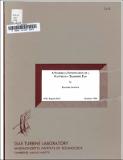A numerical investigation of a flutter in a transonic fan
Author(s)
Isomura, Kousuke
Download38078795.pdf (8.440Mb)
Other Contributors
Massachusetts Institute of Technology. Gas Turbine Laboratory
Metadata
Show full item recordAbstract
The mechanism of the bending mode flutter of a modern transonic fan has been studied using a quasi-3D viscous unsteady code. The type of flutter in the scope of this research is that for a highly loaded blade with a tip relative Mach number just above unity, commonly referred to as transonic stall flutter. This type of flutter is often encountered in modern wide chord fans without a part span shroud. The code written as a part of this research uses an upwinding scheme with Roe's 3rd-order flux differencing, and Johnson and King's turbulence model with later modification by Johnson and Coakley. An extensive series of code validation calculations were performed and the reliability of the code has been verified against data and other calculational procedures. The calculations of the flow in this fan revealed that the source of the flutter is an oscillation of the passage shock, rather than a stall. As blade loading increases, the passage shock moves forward. Just before the passage shock unstarts, the stability of the passage shock decreases, and the shock oscillates at a large amplitude between unstarted position and started position with small blade vibration. The shock foot of the oscillating passage shock on the blade pressure surface exerts the dominant blade exciting force.
Description
October 1996 Includes bibliographical references (pages 155-158)
Date issued
1996Publisher
Cambridge, Mass. : Gas Turbine Laboratory, Massachusetts Institute of Technology, [1996]
Series/Report no.
GTL report #223